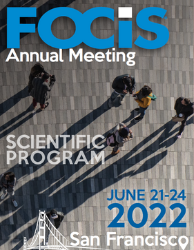Back
Immunogenetics
A Hypermorphic Variant in CARD11 Leads to A Novel Inflammatory and Immune Regulation Disorder
Wednesday, June 22, 2022
4:00 PM – 4:15 PM PT
Location: Salons 5/6
Yael Gernez, MD, PhD – Clinical Assistant Professor, Pediatrics, Stanford University; Helen Leavis, MD, PhD – Medical Microbiology – University Medical Center Utrecht; Kathleen Sullivan, MD, PhD – Professor, Pediatrics, University of Pennsylvania; Enrica Calzoni, MD, PhD – Pediatrics – Columbia University; Yannett Franklin – Pediatrics – Columbia University; David Lewis, MD – Professor, Pediatrics, Stanford University; Charlotte Cunningham-Rundles, MD, PhD – Professor, Pediatrics, Icahn School of Medicine at Mount Sinai; Andrew Snow, PhD – Associate Professor, Pharmacology & Molecular Therapeutics, Uniformed Services University of the Health Sciences; Joshua Milner, MD – Director, Division of Allergy, Immunology and Rheumatology, Pediatrics, Columbia Uniersity
Abstract Text:
Background: CARD11 is a lymphocyte scaffold protein required for antigen receptor signaling. Complete loss of CARD11 causes severe combined immune deficiency. While rare, dominant negative loss-of-function mutations lead to CARD11-associated atopy with dominant interference of NF-kB signaling (CADINS). Germline constitutive CARD11 gain-of-function (GOF) mutations cause B-cell expansion with NF-kB activation and T-cell anergy (BENTA) disease. These disorders underscore the CARD11 role in immune regulation, and suggest that discrete phenotypes can emerge from different functional classes of variants.
Methods: We examined 6 patients from 4 families with a heterozygous variant in the membrane-associated guanylate kinase domain of CARD11 (c.2542C>T, p.Arg848Cys, MAF=0.00005), presenting with variably penetrant symptoms of inflammation and immune dysregulation (autoimmune cytopenia, colitis, psoriasis and bacterial infection). T cell function and phenotyping were measured in primary patient cells and controls, and in Jurkat T-cells transfected with patient-derived CARD11 variants.
Results: Ectopic expression of CARD11 R848C into CARD11-deficient Jurkat T-cells results in enhanced NF-kB signaling only upon T cell receptor (TCR) stimulation, distinct from the constitutive NF-kB activation in BENTA-derived CARD11 GOF mutations without stimulation. Primary patient T cells had enhanced mTOR activation and cellular activation as measured by CD25 upregulation, but normal proliferative response. Patient CD4/CXCR5+ T-follicular cells and IL21 production were elevated, while CD4/CD45RA-FOXP3+CXCR5+ T-follicular regulatory cells were diminished, and Th1/Th2/Th17 cytokine production was similar to controls.
Conclusion: A relatively rare, non-private CARD11 variant leads to a unique immune dysregulation and TCR hyperactivation phenotype distinct from other known pathogenic CARD11-related diseases, illuminating a broader spectrum of pathogenic CARD11 mutations.
Background: CARD11 is a lymphocyte scaffold protein required for antigen receptor signaling. Complete loss of CARD11 causes severe combined immune deficiency. While rare, dominant negative loss-of-function mutations lead to CARD11-associated atopy with dominant interference of NF-kB signaling (CADINS). Germline constitutive CARD11 gain-of-function (GOF) mutations cause B-cell expansion with NF-kB activation and T-cell anergy (BENTA) disease. These disorders underscore the CARD11 role in immune regulation, and suggest that discrete phenotypes can emerge from different functional classes of variants.
Methods: We examined 6 patients from 4 families with a heterozygous variant in the membrane-associated guanylate kinase domain of CARD11 (c.2542C>T, p.Arg848Cys, MAF=0.00005), presenting with variably penetrant symptoms of inflammation and immune dysregulation (autoimmune cytopenia, colitis, psoriasis and bacterial infection). T cell function and phenotyping were measured in primary patient cells and controls, and in Jurkat T-cells transfected with patient-derived CARD11 variants.
Results: Ectopic expression of CARD11 R848C into CARD11-deficient Jurkat T-cells results in enhanced NF-kB signaling only upon T cell receptor (TCR) stimulation, distinct from the constitutive NF-kB activation in BENTA-derived CARD11 GOF mutations without stimulation. Primary patient T cells had enhanced mTOR activation and cellular activation as measured by CD25 upregulation, but normal proliferative response. Patient CD4/CXCR5+ T-follicular cells and IL21 production were elevated, while CD4/CD45RA-FOXP3+CXCR5+ T-follicular regulatory cells were diminished, and Th1/Th2/Th17 cytokine production was similar to controls.
Conclusion: A relatively rare, non-private CARD11 variant leads to a unique immune dysregulation and TCR hyperactivation phenotype distinct from other known pathogenic CARD11-related diseases, illuminating a broader spectrum of pathogenic CARD11 mutations.

